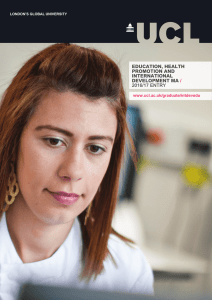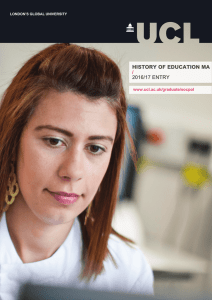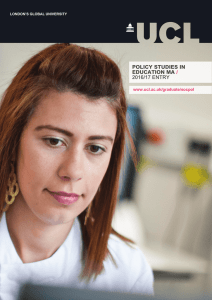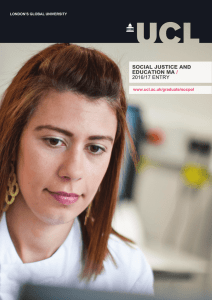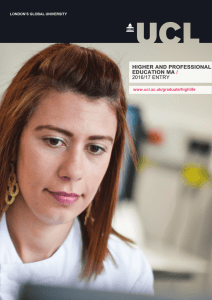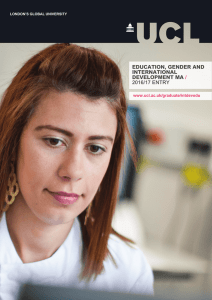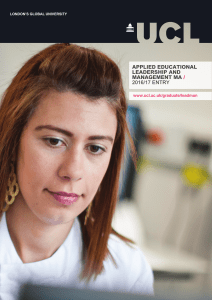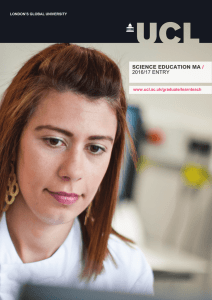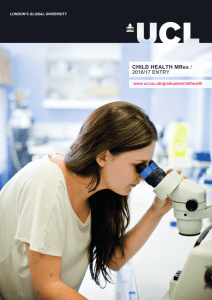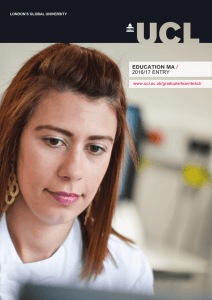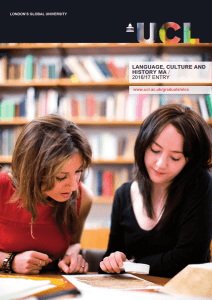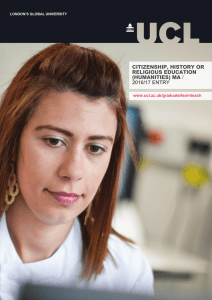DIGITAL MEDIA, CULTURE AND EDUCATION MA / 2016/17 ENTRY
advertisement
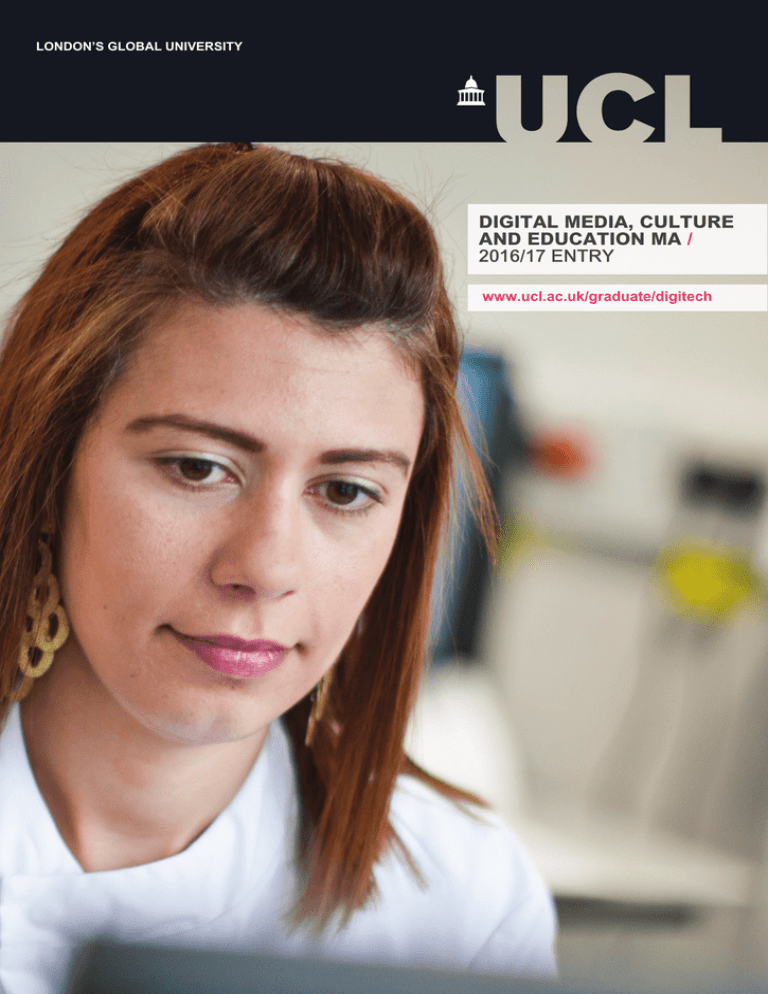
LONDON’S GLOBAL UNIVERSITY DIGITAL MEDIA, CULTURE AND EDUCATION MA / 2016/17 ENTRY www.ucl.ac.uk/graduate/digitech Digital Media, Culture and Education MA / The Digital Media, Culture and Education MA explores the theory and practice of media education and emergent new literacies in the digital age. The programme combines theory with practical opportunities for media production. Students will critically examine new developments within digital media and work with partners including the British Film Institute (BFI). Degree summary This programme provides the opportunity to explore media education, media literacy and related fields. It combines theory with practical opportunities in moving image production, Internet cultures and game design. Students will critically examine developments in the fields of new media, including the impact of new technologies on education, and debates about the place and purpose of media in society. // This programme is run by UCL's London Knowledge Lab (LKL) where collaborating computer and social scientists research the future of learning with digital technologies in a wide range of settings. LKL conducts research, design and development across a broad range of media, systems and environments and brings together computer and social scientists from the areas of education, sociology, culture and media, semiotics, computational intelligence, information management, personalisation, semantic web and ubiquitous technologies. // Students are able to work with the BFI, our partner for one of our modules, as well as leading researchers from the DARE Collaborative, a research partnership focussed on the digital arts in education led by UCL Institute of Education (IOE) and the BFI. // LKL conducts research, design and development across a broad range of media, systems and environments and brings together computer and social scientists from the areas of education, sociology, culture and media, semiotics, computational intelligence, information management, personalisation, semantic web and ubiquitous technologies. Teaching is delivered by face-to-face lectures and seminars, practical workshops combined with online-learning. Students are assessed by coursework assignments of up to 5,000 words, plus practical work for some modules, and a 20,000-word dissertation or 10,000-word report. Degree structure Mode: Full-time: 1 year; Flexible: up to 4 years Students undertake modules to the value of 180 credits. The programme consists of two core modules (60 credits), two optional modules (60 credits), a dissertation (60 credits) or a report (30 credits) and an additional optional module (30 credits). CORE MODULES // Digital Media, Cultural Theory and Education // Internet Cultures: Theory & Practice RECOMMENDED OPTIONAL MODULES INCLUDE: // Moving Image Production // Digital Games, Play and Creativity DISSERTATION/REPORT // All students undertake an independent research project, which culminates in a dissertation of 20,000-words or a report of 10,000 words. Your career Graduates of this programme are currently working across a broad range of areas. Some are working as teachers in primary, secondary schools and further and higher education, while others have jobs as within areas related to digital media. Graduates can also be found working as museum and gallery education officers and in other informal learning spaces. Entry requirements A minimum of a second-class Bachelor's degree from a UK university or an overseas qualification of an equivalent standard. English language proficiency level If your education has not been conducted in the English language, you will be expected to demonstrate evidence of an adequate level of English proficiency. The level of English language proficiency for this programme is: Special. Only the IELTS or a pass to the required standard in the Institute of Education's pre-sessional English (PASHE) course are accepted. If taking IELTS, applicants must obtain an overall grade of 7.0 with a minimum of 6.5 in the reading subtest and 6.0 in the writing subtest.. Information about the evidence required, acceptable qualifications and test providers is provided at: www.ucl.ac.uk/graduate/english-requirements FEES AND FUNDING // UK & EU (2016/17) entry: £7,145 (FT) // Overseas (2016/17) entry: £15,525 (FT) Fees note: Fees for flexible, modular study are charged pro-rata to the appropriate full-time Master's fee taken in an academic session. Full details of funding opportunities can be found on the UCL Scholarships website: www.ucl.ac.uk/scholarships APPLICATION DATE September 2016 entry: 22 April 2016 CONTACT Miss Joanne Mosselmans Email: j.mosselmans@ucl.ac.uk Telephone: +44 (0)20 7907 4625 Your application The deadline for September 2016 entry is 22 April 2016. Students are advised to apply as early as possible due to competition for places. Those applying for scholarship funding (particularly overseas applicants) should take note of application deadlines. When we assess your application we would like to learn: // why you want to study Digital Media, Culture and Education at graduate level // // // why you want to study Digital Media, Culture and Education at UCL // where you would like to go professionally with your degree what particularly attracts you to the chosen programme how your academic and professional background meets the demands of this challenging programme Together with essential academic requirements, the personal statement is your opportunity to illustrate whether your reasons for applying to this programme match what the programme will deliver. Details on how to apply are available on the website at: www.ucl.ac.uk/graduate/apply PDF Updated: May 26, 2016 Information correct at time of going to press. See website (www.ucl.ac.uk/ioe/departments-centres/departments/culture-communication-and-media) for latest information
